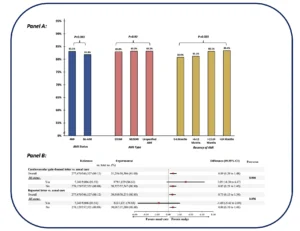Study led by Kaiser Permanente researcher included more than 25,000 Danish citizens
People who have had a heart attack responded better to an emailed flu shot reminder that explained the heart health benefits of the vaccine than to emailed letters that touted other reasons to get vaccinated, a new Kaiser Permanente study found.
The findings were presented at the American College of Cardiology annual Scientific Sessions and published simultaneously in the European Heart Journal.
The study included 25,064 Danish citizens who had had a heart attack within the previous 10 years. They were all part of a larger nationwide randomized trial of nearly 965,000 Danish citizens called NUDGE-FLU. The NUDGE-FLU trial compared the effectiveness of 9 different types of letters encouraging flu vaccination in the 2022-2023 flu season in Denmark. Each of the 9 letters used a behavioral science-based argument for the importance of getting the flu shot.

The NUDGE-FLU study found that the letter that highlighted the cardiovascular benefits of the flu vaccine proved to be most effective in increasing vaccination rates compared to usual care. The new study found that among the people who had had a heart attack, the letter that explained the cardiovascular benefits led to a more than 2.5% absolute increase in vaccination compared to those who received a standard letter.
“Overall, Danish citizens responded best to the letter that explained the cardiovascular benefits of the flu vaccine,” said lead author Ankeet Bhatt, MD, MBA, ScM, a research scientist at the Kaiser Permanente Division of Research and a cardiologist with The Permanente Medical Group. “This is particularly important in patients with a history of heart attack, where vaccination has been shown to improve cardiovascular outcomes. With the updated European Society of Cardiology guidelines now strongly recommending a flu vaccine for all people who have previously had a heart attack, implementation strategies to improve vaccination among this high-risk group are needed. We hope that this analysis adds to our knowledge on how messaging can motivate this group of patients.”
At the time they received an emailed letter promoting the flu vaccine, 1,368 (5%) of patients had experienced a heart attack within the past 6 months, 1,398 (6%) within 6 to 12 months, 2,860 (11%) within 12 to 24 months, and 19,438 (78%) within 24 months or more.
 The study found that 21,022 (83.9%) patients who had had a heart attack were vaccinated in the 2022-2023 year compared to 772,078 (82.2%) of those who had not had a heart attack. The improvements in vaccination rates among those receiving the letter highlighting the cardiovascular benefits of vaccination were consistent regardless of how long it had been since the patient had had a heart attack or the kind of heart attack they had.
The study found that 21,022 (83.9%) patients who had had a heart attack were vaccinated in the 2022-2023 year compared to 772,078 (82.2%) of those who had not had a heart attack. The improvements in vaccination rates among those receiving the letter highlighting the cardiovascular benefits of vaccination were consistent regardless of how long it had been since the patient had had a heart attack or the kind of heart attack they had.
Previous studies have found that people who have the flu are at increased risk of having a heart attack. Studies have also shown that the vaccine reduces risk of more severe heart problems in people who have recently had a heart attack.
NUDGE-FLU was possible because all Danish citizens have an email address the government uses to communicate with them about issues of national concern. Everyone in the study was eligible for a free flu vaccine. The research team now has 2 new trials underway in Denmark testing vaccination messaging strategies, one of which is focused specifically on patients with chronic disease.
“Our study highlights the effectiveness of using a behavioral science informed, low cost, low-touch approach — an emailed letter — to improve flu vaccination rates,” said Bhatt. “But I also think the findings go beyond the flu vaccine. We hope to study similar strategies that would encourage Kaiser Permanente Northern California members to get vaccines for COVID, pneumonia, and other evidence-based care.”
The NUDGE-FLU study was supported by Sanofi.
Co-authors include Tor Biering-Sørensen, MD, MSc, MPH, PhD, Niklas Dyrby Johansen, MD, Daniel Modin, MD, and Pradeesh Sivapalan, MD, PhD, of Copenhagen Univeristy Hospital; Brian L. Claggett, PhD, Scott D. Solomon, MD, and Muthiah Vaduganathan, MD, MPH, of Brigham and Women’s Hospital; Erica L. Dueger, PhD, Sandrine I. Samson, PhD, Matthew M. Loiacono, PhD, of Sanofi; Lars Køber, MD, Jens Ulrik Stæhr Jensen, MD, PhD, of the University of Copenhagen; and Cyril Jean-Marie Martel, PhD, of the Epidemiological Infectious Disease Preparedness, Statens Serum Institut, Copenhagen.
# # #
About the Kaiser Permanente Division of Research
The Kaiser Permanente Division of Research conducts, publishes and disseminates epidemiologic and health services research to improve the health and medical care of Kaiser Permanente members and society at large. It seeks to understand the determinants of illness and well-being, and to improve the quality and cost-effectiveness of health care. Currently, DOR’s 600-plus staff is working on more than 450 epidemiological and health services research projects. For more information, visit divisionofresearch.kaiserpermanente.org or follow us @KPDOR.





This Post Has 0 Comments